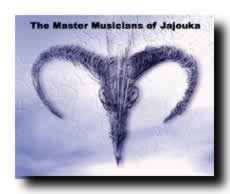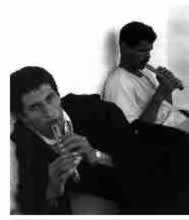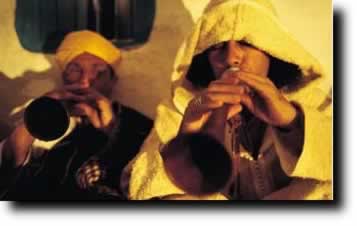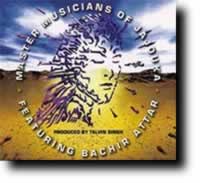The Master Musicians of Jajouka
by Ben Kettlewell
![]()
![]()
The Master Musicians of
Jajouka
by Ben Kettlewell
 Sufi
music is the indigenous music of North Africa, and with the dancing that accompanies
it is an important part of worship and daily life, dating back to over a thousand
years ago. The music can be used for healing and great powers are bestowed in
the instruments themselves. The hills of Morocco have held a magical secret
for thousands of years that has only creased the Western consciousness in the
last few decades. Morocco has a great reputation as an occasional calling place
for the musicians who favor an exotic, other-worldly groove.
Sufi
music is the indigenous music of North Africa, and with the dancing that accompanies
it is an important part of worship and daily life, dating back to over a thousand
years ago. The music can be used for healing and great powers are bestowed in
the instruments themselves. The hills of Morocco have held a magical secret
for thousands of years that has only creased the Western consciousness in the
last few decades. Morocco has a great reputation as an occasional calling place
for the musicians who favor an exotic, other-worldly groove.
A group of musicians have been passing down their unique music from generation to generation: the loud, piercing wail of their own traditional horn instruments atop the thunderous stomp of percussion. Jajoukais a small village in the foothills of the Rif Mountains of northern Morocco, where Great Pan is still honored. Transcending time, space and religion, and traveling from ancient Egypt through numerous cultures wearing various names, he survives in Jajoukanot only as a myth, but as reality - in the Master Musicians of the Pipes of Pan. Unknown to the western world for most of their history, the Master Musicians Of Jajouka were "discovered" in the 1950s by beat novelist William Burroughs and Paul Bowles, who recorded the band for the Library Of Congress. They heard that the music of Jajoukawas in a festival where this train stopped for a half hour. Brion Grison heard the music and he said to Paul Bowles; "this is the music I want to hear for the rest of my life." In his introduction for the Library Of Congress recording, Bowles focuses on the relationship between illiteracy and the arts of dance and music, Berber versus Arab music, hybrid forms, the popular national musical idiom, Egyptian influences, and the difficulties involved in recording. Notes are provided for each musical selection, including information on dance, region, and performance, as well as a list of publications anddocumentary recordings related to Moroccan music.
Jajoukais a prestigious group of musicians with the incredible vocals of Tayib Taiybe who reachs through trance, a state of spiritual experience playing steel castanets and the gumbi - a bass like instrument made from wood carnets, foot leather and sheepgut strings. The group perform possession rituals using the trance created through the rhythm of the music and the massed chorus vocals to exorcise spirits.
Rolling Stones' founder, Brian Jones went to Morocco in 1968 with Suki Poitier, and met up with Brion Gysin and a local painter named Hamri. Between them they came up with the idea of recording the Master Musicians of Joujouka, part of a nomadic Berber tribe who lived in the mountains. George Chkiantz, who was summoned over at short notice, together with Brian's Uher tape recorder, has fond memories of the four or five days he spent there. He recalls: "When Brian was in the mountains, he was splendid. He was attentive, and a great, considerate host." The local painter, Hamri described the relationship between Sidi Ahmed Sheikh and Attaris, from whom the musicians claim descent, the musicians' origins as Persian Sufis, the tradition of playing for the royal dynasty, their taste for marijuana and tobacco, the legend of Bou Jeloud and the tradition of the dancer in goat skins, festivals in honor of the god Pan, and sexual mischief amongst the musicians and villagers. Between 5-10 hours of material was recorded, during these sessions, a synopsis of the week-long "Rites Of Pan" ritual.
 Brian
Jones produced an album, just a month before his drowning death in 1969, "Brian
Jones Presents The Master Musicians Of Jajouka", introduced the unique sound
of the Master Musicians of Jajouka to much of the western world. Jones proved
to be a the catalyst for the ongoing interest in the music of the village. Hamri
brought him there because he hoped something positive and serious would come
of it for The Master Musicians and for the village.At the time, the group had
been performing their unique, drone-heavy, music for several thousand years.
Jones was honorable in his dealings with Jajoukabut, in the years since his
death, much that is dishonourable has been said, written and done. There has
been the remorseless tokenism of 'World Music'. There have been myriad attempts
at cultural hegemony on the broad-spectrum 'Beat Generation' scene. In the late
'80's, the Rolling Stones contacted them again to appear on Steel Wheels album.
Also, Bill Laswell had taken enough of an interest to also record them for his
Axiom label and collaborated with band learder Bachir Attir.
Brian
Jones produced an album, just a month before his drowning death in 1969, "Brian
Jones Presents The Master Musicians Of Jajouka", introduced the unique sound
of the Master Musicians of Jajouka to much of the western world. Jones proved
to be a the catalyst for the ongoing interest in the music of the village. Hamri
brought him there because he hoped something positive and serious would come
of it for The Master Musicians and for the village.At the time, the group had
been performing their unique, drone-heavy, music for several thousand years.
Jones was honorable in his dealings with Jajoukabut, in the years since his
death, much that is dishonourable has been said, written and done. There has
been the remorseless tokenism of 'World Music'. There have been myriad attempts
at cultural hegemony on the broad-spectrum 'Beat Generation' scene. In the late
'80's, the Rolling Stones contacted them again to appear on Steel Wheels album.
Also, Bill Laswell had taken enough of an interest to also record them for his
Axiom label and collaborated with band learder Bachir Attir.
The band, comprised of sons of sons of musicians, has subsequently recorded several unforgettable albums on their own and have been featured on albums by Ornette Coleman, The Rolling Stones, Randy Weston, Maceo Parker and Jimmy Page & Robert Plant. An album released by the group in 1992, Apocalypse, was produced by Bill Laswell. Proclaimed "one of the most musically inspiring groups in the world" by Mick Jagger, the Master Musicians of Jajouka perform a hypnotic style of music that {The African Music Encyclopedia} described as "a strange (at least to western ears) combination of high-pitched, nasal, buzzing, sounds (imagine a swarm of bees) with surging waves of rhythm which can induce an ecstatic trance state".
In 1973 Ornette Coleman took a significant trip with writer, Robert Palmer to Morocco , on the same path as long time beat associates like Allen Ginsberg, William Burroughs and Paul Bowles to Morocco to work with the Master Musicians of Jajoukain their mountain villages. The penetration of music and spirituality into daily existence was an inspiration. Don Cherry described the scene to writer Ben Sidran in his book, 'Talking Jazz': "They would have a little hut that you would go up to every night and play. You know, sit up and cut the kif and they would just play music almost all night. And they would be playing those pan or double reed instruments and the flute, which is the 'rhaita', which you play from the top of the cane, of the bamboo." Music from those nightlong jams round the fire was used as 'Midnight Sunrise' on the energizing, exuberant album, 'Dancing In Your Head,' often cited as an important step in the genesis of Ornette Coleman's electrified Prime Time group. Coleman travelled to Morocco in 1973 and waxed these (both fairly brief) tunes by simply playing over selections from the repertoires of the Moroccan musicians themselves. According to Scott Currie's well-researched (and referenced) notes, the first take of "Midnight Sunrise," a winding piece with Coleman stuttering powerfully, derives from a Jajoukan melody called "Hadra"; the alternate, where the beat is more driving and Robert Palmer's clarinet--yes, it's the renowned critic, whose initial idea it was for Coleman to travel to North Africa--nudging Coleman's for improvisational space, seems to come from what Currie conjectures to be "a Jibli folk tune."
 An
all male group, the Master Musicians Of Jajouka features fifteen rhaita (a double-reed,
oboe-like, instrument) players and five drummers. Only a son of a master musician
can become a master musician. Members of the group, who speak Arabic, adopt
the surname "Attar", which translates as "the perfume maker". The band continues
to reside in Jajouka, a small village in the foothills of the Rif Mountains.
What kind of group could fascinate and attract such an illustrious group of
artists? Even in the realm of 'world music,' the Master Musicians hold a unique
place. Their music provides not just plain entertainment but also spiritual
out-reach that is common in their all-night, all-day sessions. The music is
a special gift from God, given to the family. This music can't be played by
anyone but the family of Attir. You have to learn this music when you are a
child and you have to be from the family. Jajoukamusic has been described as
"Part theatre, part dance, part concert and part ritual. The Master Musicians
are a special caste exempt from farm work. The sons and grandsons of Master
Musicians, they have done nothing else since birth and perhaps before. While
they differ widely in age and appearance, they all have the mark of the professional,
of someone who does what he does superlatively well. Musicians are magicians
in Morocco, and they bear the mark of the conjurer, the magic man. They are
evokers of the djenoun forces, spirits of the ills and the flocks and above
all; the spirits of music.
An
all male group, the Master Musicians Of Jajouka features fifteen rhaita (a double-reed,
oboe-like, instrument) players and five drummers. Only a son of a master musician
can become a master musician. Members of the group, who speak Arabic, adopt
the surname "Attar", which translates as "the perfume maker". The band continues
to reside in Jajouka, a small village in the foothills of the Rif Mountains.
What kind of group could fascinate and attract such an illustrious group of
artists? Even in the realm of 'world music,' the Master Musicians hold a unique
place. Their music provides not just plain entertainment but also spiritual
out-reach that is common in their all-night, all-day sessions. The music is
a special gift from God, given to the family. This music can't be played by
anyone but the family of Attir. You have to learn this music when you are a
child and you have to be from the family. Jajoukamusic has been described as
"Part theatre, part dance, part concert and part ritual. The Master Musicians
are a special caste exempt from farm work. The sons and grandsons of Master
Musicians, they have done nothing else since birth and perhaps before. While
they differ widely in age and appearance, they all have the mark of the professional,
of someone who does what he does superlatively well. Musicians are magicians
in Morocco, and they bear the mark of the conjurer, the magic man. They are
evokers of the djenoun forces, spirits of the ills and the flocks and above
all; the spirits of music.
In the early 1990s, the Master Musicians Of Jajouka were led by Bachir Attar, whose father had led the group in the late 1960s. Attar, who lives half the year in New York, has subsequently left the band to pursue a solo career. The Master Musicians Of Jajouka's first tour of the United States, in 1997, included a reenactment of the week-long lunar feast of Aid El Kabir. In 1999, the group was visited bv Sonic Youth guitarist Lee Renaldo.
Like Renaldo, many pseudo-hip figures with pristine international reputations have been shameful in their uncharacteristically discreet negotiations with the Musicians on the mountain. The music of Jajoukais still one of the most liberating of musics, a secret message to the soul at a time when the soul has been effectively discredited by conservative forces. Hamri, the Painter of Morocco, believes that the world now needs the healing powers of The Master Musicians.
The people of Jajoukashare this belief. Their village, sublime in it's silence and tranquility, is by the way of sharp contrast with the post-modern cosmopolis. For sure, the world outside the village is a battered and tragic place where there is no respite from moribund philosophy or from an increasingly malevolent media/State interface. As the leader of Master Musicians of Jajouka.
 Bachir
Attar is responsible for the preservation of a priceless musical tradition.
As the groups new leader, he boldly recasts that tradition as Afro-beat free-jazz
adventure...the gods will surely dig these grooves. Bachir sought the talents
of Talvin Singh to produce the ensembles latest album, 'Master Musicians of
Jajouka & Talvin Singh'. Talvin is a prolific DJ in London's underground
music scene (the legendary Anokha nights) as well as producer on a multitude
of highly successful records. He has collaborated musically and as a producer
with Björk on Debut and Possibly Maybe.
Bachir
Attar is responsible for the preservation of a priceless musical tradition.
As the groups new leader, he boldly recasts that tradition as Afro-beat free-jazz
adventure...the gods will surely dig these grooves. Bachir sought the talents
of Talvin Singh to produce the ensembles latest album, 'Master Musicians of
Jajouka & Talvin Singh'. Talvin is a prolific DJ in London's underground
music scene (the legendary Anokha nights) as well as producer on a multitude
of highly successful records. He has collaborated musically and as a producer
with Björk on Debut and Possibly Maybe.
This is a Jajouka album, produced and featuring Talvin Singh. As with Talvin's last album, 'OK', it is a fusion of traditional and contemporary music; it is a blend of the hallucinogenic and hypnotic sound of the Master Musicians of Jajouka, with the cutting edge of dance, techno and drum and bass loops. The album will appeal to fans of Talvin and his musical scene, as well as fans of Jajouka and world music.
As well as being classically trained by Indian masters as a tabla player, Talvin Singh is one of Britain's most creative and popular producers and DJs. In 1999 he won Britain's prestigious Mercury Music Prize for his album OK, which catapulted him to wider popularity. He is the dynamic purveyor of "tablatronics" miked-up tabla playing and the techno and drum 'n' bass treatment of traditional, mainly Indian, classical music. The results of these seamless fusions are highly renowned and exceptional. The Master Musicians of Jajouka are Moroccan tribal musicians. Members are literally "born to be musicians". They are striving to keep their way of performing alive and this album helps to bring them to a contemporary audience. In the 1960s, Brian Jones of the Rolling Stones produced their first record. Since this "discovery", their influence has been far reaching in musical circles from the Rolling Stones and Ornette Coleman to 10,000 Maniacs and Guns & Roses. The time for the music of Jajoukah as certainly arrived.
This site is copyrighted ®© AMP/Alternate Music Press, 1997-2024. All Rights Reserved.
Unauthorized duplication and distribution of copyrighted material violates Federal
Law.